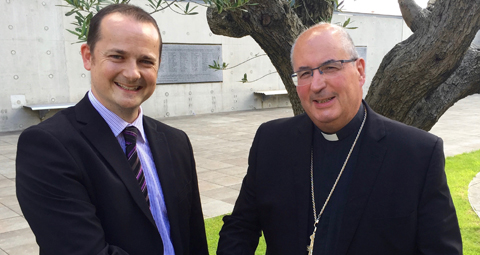October 14 | ![]() 0 COMMENTS
0 COMMENTS ![]() print
print

Catholic Social Teaching can be the cure for the ills of the world
By Anthony Horan
THE Catholic laity, armed with the social teaching of the Church, can play a pivotal role in the future of our country.
I have been honoured to meet many kind-hearted, generous and committed people in the first seven weeks or so in my new post of director of the Catholic Parliamentary Office. This includes most of the eight bishops of our country, with whom I have spoken at length about my hopes and aspirations for the parliamentary office.
Networking is pivotal to this role and I will continue to meet with important stakeholders as well as politicians in the weeks ahead. Aside from networking, the work of the Catholic Parliamentary Office will include monitoring and examination of the work of the Scottish and UK parliaments and governments; responding to parliamentary and government consultations, questions from politicians, and enquiries raised by Catholic parishioners and the general public; raising awareness and building up knowledge of Catholic Social Teaching; and encouraging greater involvement of Catholic youth in politics.
As you can see, there is a lot for me to chew over as I set about re-establishing the parliamentary office and building on the excellent work of my predecessor John Deighan.
In order to lay strong foundations for the work of the office going forward I would like to make Catholic Social Teaching as accessible as possible so that we all understand its true beauty and goodness and the positive message it brings to our world.
Consider these questions: Do you want a world where the family is given its rightful place as the foundation of society and is both celebrated and protected for the unique contribution it makes? Do you want a world where children are raised within the solid framework of a secure and loving marital relationship and where mother and father are committed both to one another and to the health and wellbeing of their children?
Do you want a world where the dignity of the human person is central to all things and the most basic rights, including the right to life, are afforded to all, including the most vulnerable? Do you want a world where the needs of the poor are given special attention with a view to alleviating their poverty and integrating them fully into society?
Do you want a world where people take seriously their duty to protect the earth and to ensure its fruitfulness for future generations? Do you want a more peaceful world?
By applying Catholic Social Teaching we can achieve all of these ideals. And part of my job will be to persuade politicians that this is the case. However, I cannot possibly do this without the help of the Catholic people of Scotland. And this is why I feel it is important for all of us to explore Catholic Social Teaching and to build up an understanding of it.
I also believe it is important to encourage the Catholic community, both as individuals and as parishes, to engage with their politicians and to ensure that their politicians are aware of good works the parish is doing in the community. Much of what the Catholic Parliamentary Office does in the months ahead will be focused on building up awareness and knowledge of Catholic Social Teaching and encouraging greater communication between the Catholic community and local politicians.
I am also keen to explore the value of a greater engagement with our Catholic youth in order to encourage them to become more involved in the political process and perhaps even consider a career in politics. The Scottish Youth Parliament is a fantastic opportunity for our young people to get more involved and I would urge all youth aged 14 to 25 to seriously consider standing as a candidate in the elections for the Scottish Youth Parliament.
We desperately need a strong Catholic voice in our Parliament. Why then shouldn’t we indulge in a bit of forward planning and start forming our politicians of the future?
I firmly believe that the social doctrine of the Church, which has the values of truth, justice, freedom and love underpinning it, has a pivotal role to play in the future of our country. It is our duty, as a Catholic people, to evidence these values in all that we do and to work for the common good, which, as Pope Benedict XVI said, ‘is the good of all of us.’
Moral relativism has been slowly chipping away at the Christian values upon which our country has flourished for so long. And what is the effect of this?
The most vulnerable human beings, including the unborn, elderly and disabled are deemed to be dispensable; the family unit which has been the staple diet of civilisation for so long is being destroyed; and the poor are feeling more and more marginalised. Catholic Social Teaching, inspired by Christ, is the cure for the ills of the world and the key to peace.
Anthony Horan is the director of the Catholic Parliamentary Office.
PIC: Anthony Horan with Archbishop Philip Tartaglia











